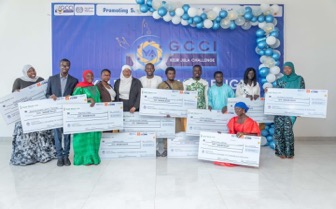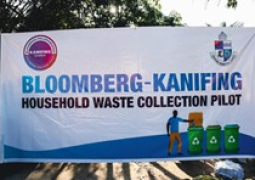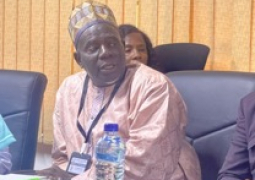
The nineteen (19) pitchers, who emerged as winners at the end of the competition, were each awarded cash prize ranging from D50,000 to D150,000. The National Business Plan contest also known as Keur Jula challenge was launched in July 2022 and a total of 450 applications were received from a wide range of sectors such as creative sector, health, agriculture, food and beverages, ICT, logistics and trading sectors out of which 233 were selected for audition.
Four successful rounds of auditions were completed in which the finale was conducted during the boot camp, which featured thirty-four participants. The finalists were assessed on feasibility, presentation skills, financials, operational plan and the consistency of ideas of each entrepreneur.
In her statement, Sarata Conateh, chief executive director of GCCI, said that the initiative was meant to unleash the potential of young entrepreneurs, clarifying that the award is not a competition.
Madam Conateh thus congratulated the winners and all the other contestants for coming out and showcasing their talents.
She pointed out that GCCI would continue in its efforts to strength partnership, innovation and connect more entrepreneurs with policymakers and business support organisations to improve conditions of their businesses.
Edrissa Mass Jobe, GCCI president, thanked partners and contributors for the successful conduct of Keur Jula challenge.
Sharing his experience in the business fraternity, President Jobe reminded that the greatest leaders, the ones he respects most, are entrepreneurs and social change makers.
“Businessmen are profit focus, while entrepreneurs are solution focus. These are the drivers of economic growth and national development.” Mr Jobe said.
He thus advised youth to grow up and be leaders in view of the fact that leadership is the exclusive domain of the young since they have ideas, energy, emotions and the ingredients of good leadership.
Bakary Badjie, minister for Youth and Sports, acknowledged that the country is blessed with abundant talents, yet very limited opportunities are made available to young people to harness their potentials.
Minister Badjie believes the private sector is the engine of economic growth and is therefore highly regarded in job creation.
He acknowledged youth entrepreneurship as one of the surest ways to reduce high unemployment rate and create economic independence for the young people that can enable them to be self-sustaining and to be able to contribute towards the growth of the economy.
He thus expressed his ministry’s resolve to continue showing commitment in providing the necessary support through their enterprise development agency and also work with other agencies to create employment opportunities for young people.
“Promoting entrepreneurship is a means of helping young people in employment. The ILO is committed to helping young people. Skills, financial resources, and all give them the opportunity to excel in their businesses.”





